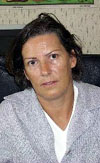 KILDARE, 30 August: by Grace Halford. "I grew strong and I learned how to get along ... I will survive" - the famous lyrics of Gloria Gaynor may have been about how to survive a broken heart but they could just as well be about how to survive the break up of a violent relationship.
KILDARE, 30 August: by Grace Halford. "I grew strong and I learned how to get along ... I will survive" - the famous lyrics of Gloria Gaynor may have been about how to survive a broken heart but they could just as well be about how to survive the break up of a violent relationship.
Violence in the home is a subject which many people find difficult to discuss and perhaps the attitude in Ireland is 'if it doesn’t affect me, let's not worry about it'. However, it does exist, and is even more prevalent than most would care to admit.
As Jacinta Carey (right) of the Kildare Women’s Refuge told KNN, 'no one expects to get involved with a violent relationship, its not something which people go out in search of, its just something that happens.'
It affects people from a diverse range of backgrounds and is not specific to poverty stricken or alcoholic environments. She told KNN that it affects women of all ages ranging from teenage girls who get involved with violent boyfriends to elderly women whose teenage and adult children abuse them. She explained that the number of women ringing the centre about incidents, which were not related to spousal abuse, was on the increase and something, which was very alarming.
The centre was established in 1997 in response to the number of cases of violence against women in the Kildare area and from here the Eastern Health Board approached them with the idea of establishing a full crisis accommodation centre for Kildare. Funding for the project was made available through several sources including local fundraising, Action South Kildare and the Eastern Health Board. Jacinta also acknowledged the support they received from Sen. John Dardis who she explained was instrumental in obtaining funds from the Tanaiste Ms Mary Harney’s Social Inclusion Fund.
The Refuge offers a free and confidential service to women who are affected by physical abuse in the Kildare area. Although it is still in the initial stages of development, it will, when it is finished house up to ten families and include two self contained apartments catering for women with older children who Jacinta explained sometimes find it difficult to find accommodation.
The centre will be a safe place for women to sort themselves out and organise themselves. She also explained that it would offer a service where by women could avail of medical, legal and social welfare services from within the centre avoiding having to go in search of information regarding what exactly their legal entitlements were. The issue of financial entitlements was one, which sometimes made women feel that perhaps they would be better off where they were and this was something, which the centre aimed at rectifying.
The centre also runs an information initiative for teenagers in local schools dealing with how to recognise an abusive relationship. She also added that awareness was needed regarding mental abuse and torment, which was just as significant and perhaps even more debilitating than physical abuse. She explained that just because there are no physical marks or bruises, no woman should feel that they are alone and no one would believe them. The message the centre wanted to convey "was you would be believed and that there was no need to feel alone or that there was no where to turn."
Jacinta also told KNN that the more we talk about the issue of abuse and the more public awareness we create the more of a chance they had of preventing cases like this in the future.
For further information regarding the women’s refuge please contact Jacinta at 045-438461.
©2001gracehalford/knn